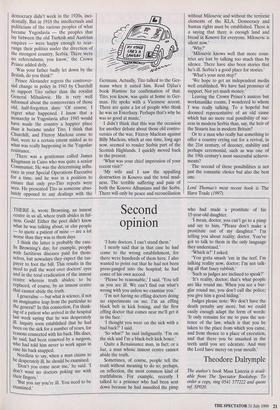Second opinion
THERE is, wrote Browning, an inmost centre in us all, where truth abides in ful- ness. Gosh! Either the poet didn't know what he was talking about, or else people — to quote a patient of mine — are a lot worse than they was in them days. I think the latter is probably the case. In Browning's day, for example, people with factitious diseases paid for them- selves, but nowadays they expect the tax- payer to foot the bill. This results in the need to pull the wool over doctors' eyes and in the total eradication of the inmost centre wherein truth abides; to be replaced, of course, by an inmost centre that cannot abide the truth.
'generalise — but what is science, if not an imaginative leap from the particular to the general? In this connection, I'm think- ing of a patient who arrived in the hospital last week saying that he was desperately 111. Inquiry soon established that he had been on the sick for a number of years, for reasons connected with his back. His discs, he said, had been removed by a surgeon, who had told him never to work again in case his back snapped. Needless to say, when a man claims to be desperately ill, he should be examined. `Don't you come near me,' he said. 'I don't want no doctors poking me with their fingers.' `But you say you're ill. You need to be examined.' `I hate doctors. I can't stand them.'
I nearly said that in that case he had come to the wrong establishment, for there were hundreds of them here. I also wanted to point out that he had not been press-ganged into the hospital; he had come of his own accord.
`Please be reasonable,' I said. 'You tell us you are ill, We can't find out what's wrong with you unless we examine you.'
`I'm not having no effing doctors doing no experiments on me. I'm an effing black belt in kick boxing, and the first effing doctor that comes near me'll get it in the face.'
`I thought you were on the sick with a bad back?' I said.
`So what?' he said indignantly. 'I'm on the sick and I'm a black-belt kick boxer.'
Quite a Renaissance man, in fact; or a liar, a man whose inmost centre cannot abide the truth.
Sometimes, of course, people tell the truth without meaning to do so; perhaps, on reflection, the most common kind of truthfulness. For example, recently I talked to a prisoner who had been sent down because he had assaulted the pimp who had made a prostitute of his 15-year-old daughter.
`I mean, doctor, you can't go to a pimp and say to him, "Please don't make a prostitute out of my daughter." I'm telling you about reality, doctor. You've got to talk to them in the only language they understand.'
`Which is?' I asked.
`You gotta smash 'em in the teef. I'm talking reality now, doctor; I'm not talk- ing all that fancy rubbish.'
`Such as judges are inclined to speak?'
`It's reality, doctor; that's what people are like round me. When you see a bur- glar round me, you don't call the police; you give him a good hiding.'
Judges please note: We don't have the death penalty any more, but we could easily enough adapt the form of words: `It only remains for me to pass the sen- tence of the law, which is that you be taken to the place from which you came, and from thence to a place of execution, and that there you be smashed in the teeth until you are edentate. And may the Lord have mercy on your mouth.'
Theodore Dalrymple
The author's book Mass Listeria is avail- able from The Spectator Bookshop. To order a copy, ring 0541 577222 and quote ref SP020.


























































 Previous page
Previous page